California Innocence Project: The man who helps people on death row
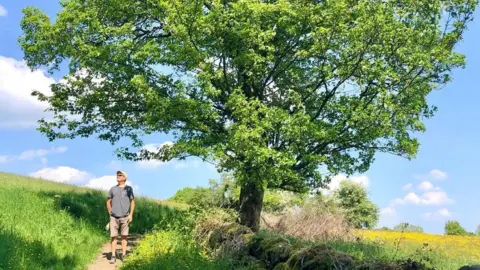 Justin Brooks
Justin BrooksJustin Brooks has helped free 35 people from death penalties and life sentences - and has even been played in a film by Greg Kinnear. BBC News speaks to him on one of his visits to his Derbyshire holiday home to find out what drives him in his quest for justice.
As a young American law professor, Justin Brooks was reading a newspaper one day while preparing for a class in Michigan when a story caught his attention.
It was a report about 21-year-old Marilyn Mulero who had been sentenced to death for a double murder in Chicago after her legal team had encouraged her to take a plea bargain and give up her chance of a trial before a jury.
Justin became interested to know more about the woman and why she had taken the plea bargain.
"She gave up the right to a trial with a plea bargain and got a death sentence," said the 56-year-old criminal defence lawyer and law professor.
"I went to meet her and she told me she was innocent so I went back to the law students I was teaching and said 'Who wants to help me investigate this case?' and four students raised their hands."
What followed next was like a scene from a film as Justin and his students sat up in his kitchen one evening, combing through all the reports of the case.
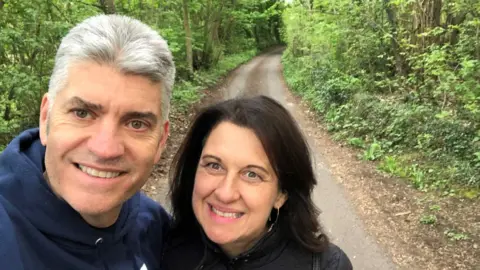 Justin Brooks
Justin BrooksAs they started looking into matters they found several flaws in the police investigation and defence case.
Among these, Justin said, was the fact her interrogation had lasted for 14 hours.
Further investigation found the woman's lawyers had failed to visit the scene of the crime and collect evidence, meaning they were reliant on witnesses' statements.
When Justin himself visited the scene, he found a key witness had lied about being able to see what happened from her apartment window because the obstructions and angle of her home made that impossible.
"He [the lawyer] did no investigation in the case," said Justin.
"We found out the woman claiming to be a key witness had fabricated her story and was a girlfriend of one of the victims.
"I stood right where she said she was seeing the killing from on a bright, sunny day and I couldn't see [the scene] and this shooting happened at night. There were trees blocking the view and a food van - it was impossible to see.
"If the lawyer had done a simple thing like that he would have known the witness was lying and the case would have fallen apart."
Justin then took on the case from the woman's original legal team and lodged an appeal.
Years of legal work to overturn her conviction followed.
"She went back in front of a new jury and argued for her life," he said.
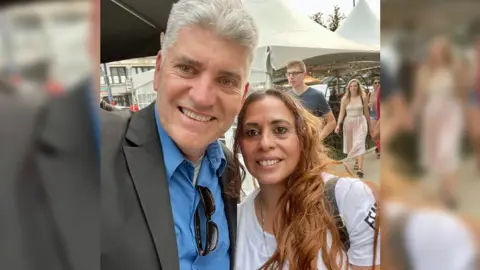 Justin Brooks
Justin BrooksShe has now settled in a new job and has been reunited with her family.
The actual killer, Jackie Montanez, has now admitted she alone planned the murder.
"Over 25 years I argued through all the courts, and when I got the call about Marilyn going free I literally couldn't speak," Justin said.
"I started the case when I was 29 and it finished when I was 55.
"It was emotional.
"The law students who helped are all middle-aged people now. There were a lot of tears when I told them."
That case and others like it inspired Justin to co-found the California Innocence Project, a non-profit organisation which relies on funding and donations to keep running.
He works together with nine full-time legal staff and 100 volunteers to help free people who have been wrongfully convicted, particularly those who spend decades behind bars.
One of the group's most high-profile cases was that of football star Brian Banks who, aged 17, was sentenced to six years in jail for a rape he did not commit.
The woman eventually withdrew her claims and apologised and Mr Banks called on Justin to help get his conviction overturned.
It was successfully reversed in 2012 and the case is now the subject of a film with Greg Kinnear playing Justin.
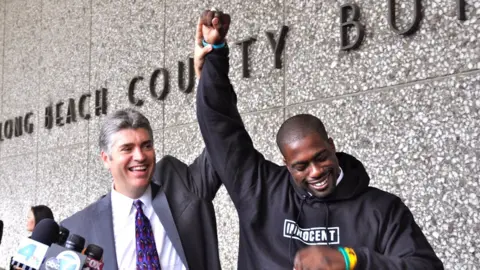 California Innocence Project
California Innocence ProjectJustin cannot take on every case he is contacted about.
He said deciding which cases to accept and which to reject can be difficult.
"There is a 1,000 to one chance from a letter being sent to someone walking out of prison," he said.
"Sadly most of the cases I say no to because it is important to be able to prove their innocence and not just gather the evidence.
"The hardest part of the job is saying no all the time. It really grinds me down. I need to start taking myself out of that process or I can't keep doing this.
"Every one is a tragic case. Even when people aren't innocent it's a tragic case - there are destroyed lives, murdered victims.
"I reach a point I just can't put another case in my head. It gets too much.
"I drive around California and my wife has to stop me from telling her where all the murders happened.
"I point out where this body was found or where that homicide happened. I just can't drive past and not think about that stuff."

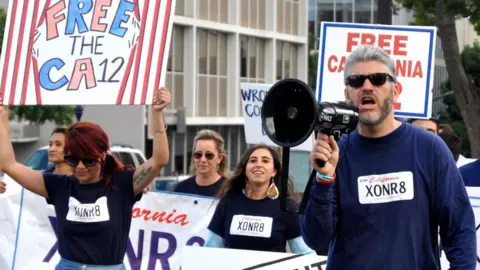 California Innocence Project
California Innocence ProjectWhat is the California Innocence Project?
- It is a non-profit organisation that investigates the cases of innocent people in prison or on death row.
- Justin quit teaching and co-founded the California project in 1999. It is one of the largest of its kind, taking on around 150 cases a year.
- In 22 years it has helped 35 innocent people walk free.
- The organisation is one of around 60 similar projects in the US, 40 in Europe and Asia, and Justin helped set up 25 in South America.
- When in the UK, Justin also works with the London, Manchester and Cardiff projects and helps train law students.

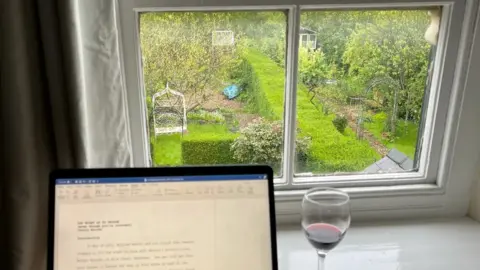 Justin Brooks
Justin BrooksThe stress of his job takes Justin on regular visits to his second home in the UK - in the market town of Belper, Derbyshire - where he likes to go on long walks and get lost in British country life.
Here he has a 240-year-old cottage with his Derbyshire-born wife Heidi, whom he met in 1988 when she was working in the US as an au pair.
The pair usually spend several months a year in England visiting her friends and family, particularly at Christmas.
Three years ago they decided to buy their own cottage to have somewhere to stay on these visits, and Justin has fallen in love with the escapism it provides.
"I have too many bodies in my head and it becomes overwhelming," he added.
"So I love getting on the plane and getting out of that.
"That's why I love going to Belper. I have never been involved in anything criminal there.
"When I go walking in Matlock, I can stop and relax and I'm completely cut off from the world."

Follow BBC East Midlands on Facebook, Twitter, or Instagram. Send your story ideas to [email protected].
